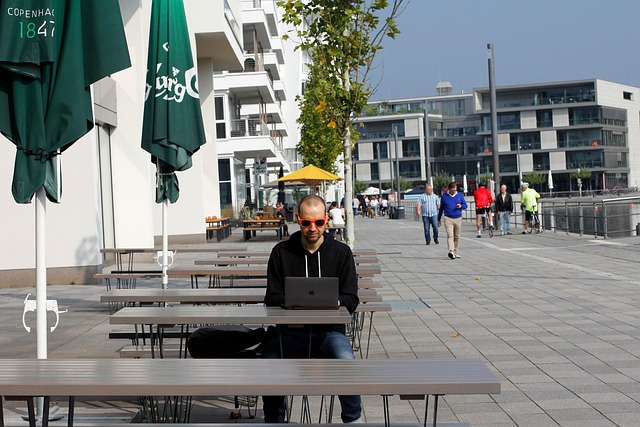
Over the past few years, there has been an increase in remote working opportunities in the UK. Some industries still heavily rely on staff members being physically present. This trend is expected to change as more people think about work-fromhome options.
There are many reasons people choose this option. One of the greatest benefits is the ability to save both time and money. Part-time remote workers, for example, can save approximately 45% on office cleaning costs and 36% on lunches. Moreover, a lot of the expenses related to commuting and parking can be avoided. Another advantage is the flexibility you have in your working hours.
Reach magazine conducted a study and found that nearly a third (33%) of British workers wish to work at home. It was also revealed that more workers are suffering from loneliness when working from home. Nearly half the workers believe remote work has a negative affect on creativity or communication. Respondents to a Reuters survey also expressed these concerns.

You will need a visa if you plan to work from abroad. There are several factors that go into determining if you are eligible for a remote work visa. First, you must be employed by a UK-based company for at most 26 weeks. Employer sponsorship is also required.
It's not an easy task to get a remote worker visa. This requires specialist advice. As well as this, you will have to understand the exchange rate between the Euro and the Pound, and the payment process.
Safety and health are also important considerations. Remote workers must make sure confidential information is safe. They will also need to ensure that documents are kept securely. They should also make sure they have appropriate care arrangements for their children while they are working.
Many businesses want to increase the number of people who can work remotely. However, these companies also worry about the impact that it can have on productivity. This concerns not only remote workers, but also the likelihood that they will be promoted.

Another concern is that many people think that they are more productive when working from home. Working from overseas can be difficult because of complex immigration and tax laws. You should also check the regulations of the country you are visiting.
Even if the UK is your home, you will need to have a work visa in order to travel. You may need to apply at the embassy of your home country for a visa depending on how long you are staying.
Knowing your visa requirements is the best way to avoid any potential problems. You may be allowed to travel to the country temporarily without a work visa. However, you might need a permit for a longer period.
FAQ
Where do digital nomadic's often eat?
A digital nomad can be defined as someone who travels without permanent ties for business or pleasure. After Tim Ferriss, an American author, invented the term digital nomad in 1999. He had just quit his job to move to Thailand. He called him an "anticorporate crusader."
Digital nomads are more prevalent than ever. Nomadic Matt reports that there are currently 11,000,000 active digital nomads around the world.
The average person spends between $1,000 and $2,500 per month while traveling. This is why digital nomads tend to avoid cities like New York City, Los Angeles and San Francisco. Instead, they travel to where the food costs are low.
Digital nomads are known to eat out at any place, including cafes and restaurants. Nomadic Matt suggests that coffee shops are the best places to meet them, as they spend much of their time talking and sitting.
Ask locals to help you find these places. If you don’t speak the local language, check out reviews and photos online. Ask other travelers how much they paid to eat at their favorite restaurants. You can then choose a similar restaurant to yours. For example, if you pay $10 for lunch in Paris, then try to find something with similar prices in Rome.
TripAdvisor or Yelp are two other great ways to find these locations. Google Maps allows you to search for specific locations.
Do digital nomads earn a lot?
Digital nomadism is an intriguing phenomenon. The lifestyle of traveling for months at time. Some people believe this could be the future work environment. Some people think it's a fad. However, it doesn't matter which side you are on. It has certainly made an impact.
Since 2008, the number working remotely has risen dramatically. FlexJobs has found that remote workers are now more common than traditional office workers.
But what is the average income of digital nomads? Well, it depends on what kind of job you're doing, which country you live in, and whether or not you're self-employed.
According to Nomadic Matt's website, he earns $10-$20k monthly. However, that figure includes his income from blogging, speaking engagements, and consulting gigs. These jobs, he says, aren't sustainable as they require too much work. He also stated that he travels around 80% of the time.
But, Thailand is a country where you can make more than Americans. Expatistan estimates that the average monthly income is USD 4,000. This is almost double the US median salary.
You will not only earn more but you will also be able to enjoy lower taxes, and lower housing costs. So, consider it seriously if you've been thinking about moving abroad.
How do digital nomads get paid?
Upwork and Freelancer both offer great opportunities for remote jobs. However, they make it easy for freelancers and contractors to find clients.
They can help you build a portfolio of skills and show off your experience. They give feedback and keep track of which projects you have completed.
A variety of apps and tools online can help manage your time, communicate to potential employers, or automate tasks.
However, there are also some pitfalls. If you are looking for a job, there may be scams and fake profiles. Freelance platforms can charge fees but provide no value to the client.
Previous clients might leave bad reviews. You may also fall for identity theft.
The best way to avoid these problems is to vet the site carefully before signing up. Seek out testimonials and reviews. Do not trust employers that have not thoroughly vetted candidates.
Because you won't be meeting them face-to–face, it's crucial to keep your eyes open for scammers while working remotely.
It won't be a problem if you're cautious.
What is a digital nomad's typical day like?
A digital nomad's day can vary depending on where they live. It could include:
-
Set up new logins and accounts
-
Content creation (articles, blogs)
-
Researching new markets
-
Make new connections
-
Find new opportunities
-
Negotiating contracts
-
Working on projects
You must master the art of juggling all aspects of your life in order to become a digital nomad.
You need to set a time and schedule that is flexible enough to allow you finish your tasks and still have fun.
Perhaps you have a morning routine that includes checking your email, scheduling meetings and responding to emails. Then, you take a few hours off to relax once you finish lunch.
After dinner, you start your evening routine. This involves checking social media, reading blogs, writing blog posts, and sending emails. The rest of the night is yours alone.
This will ensure that you are not overwhelmed and allow you to maximize your productivity during the day.
How much does it cost to be a digital nomad? And how long do you need to travel before you can call yourself one?
Digital nomadism can be defined in many different ways. Many people consider "digital nomadic" a general term that covers freelancers entrepreneurs, independent contractors and travelers.
Others use the term to mean people who move to live online for work and travel anywhere between 6 months and 2 years. To be considered a digital nomadic, you must do something online. It is not enough to be just traveling around the world.
Digital nomads can earn enough money to live comfortably without having to worry about finding work. However, others make less than $10,000 per year.
Nomad List reports that the average digital nomad's monthly salary is $3,500.
A digital nomad is someone who travels for work and has no fixed time frame. Most people believe that if your travels are for work, then you have already been classified as a digital nomad. You could still qualify even if your work is part-time.
In fact, according to NomadList, the average length of stay for digital nomads is 3-6 months. That means you'll probably need to travel at least twice during that period.
Digital nomads often work remotely, which helps them save money on rent. They can also avoid travel costs.
This is why becoming a digital nomad might not be for everyone. It requires quite a bit of planning and discipline. To be successful, you need to have a lot more time.
Here are some things to keep in mind if you're thinking of becoming a digital nomadic.
-
What amount of time do you have to devote to your work?
-
What type of work will it be?
-
What will be your base?
-
Will you be required to relocate frequently?
-
Are you saving money?
-
Are you willing to sacrifice certain aspects of life (such as relationships)?
-
Is it possible to leave your current job?
-
Do you ever think about what you would like after you leave work?
-
Is there anything that is keeping you from jumping?
-
Do you have any questions regarding being a digital Nomad?
-
How would your lifestyle be described?
-
Would you recommend it for someone else?
-
Do you have any tips for digital nomads who are just starting out?
-
Which advice would you offer to someone thinking of becoming a digital nomad?
What is the digital Nomad lifestyle?
A digital nomad is a person who lives in constant motion. Their lives are flexible, mobile, and fluid. They can travel anywhere with a laptop, an Internet connection and a reliable way of charging their batteries.
They travel to work, for pleasure, or business. They move around the world in their bags for weeks without even thinking about it.
The digital nomads will be our future. They are the next generation who doesn't have land or a home. These kids grew up playing online videogames.
Digital Nomads are the next generation of travelers. They are the ones that will revolutionize how we travel.
How can you stay safe when living as a digital nomad?
You'll always be online, because that's where your closest friends and colleagues are. But as a digital nomad, you won't necessarily live out of an office, either. How do you balance safety and travel?
You must first make sure that your computer is clean. This means that you must install the latest Windows and Mac OS X updates and keep them up to date.
You also need to ensure your software is running the latest version. You should update your software immediately if it isn’t. If the cloud services you rely upon, such as Dropbox or iCloud, then you might lose your files.
VPN (virtual personal network) services protect your internet connection from outsiders. Your ISP may charge extra for data usage abroad, so it pays to check whether you're eligible for a free trial.
VPNs not only protect your privacy but also make it difficult for hackers intercept your information. If connecting to public WiFi networks, consider downloading a VPN app onto your mobile device.
Make sure you have your phone charged. You could save hours searching for someone you lost your passport or wallet by having your contact details available.
Statistics
- All it takes is a 5% better profile and proposals than your competitors. (travelinglifestyle.net)
- According to Statistica Research Department, the number of digital nomads is increasing every day, with more than 15.5 million digital nomads in 2021. (gooverseas.com)
- 98% of claims are paid: Filing an insurance claim is relatively easy and seems faster than the industry average. (travelinglifestyle.net)
- In general, you can expect to pay around 5 to 10 percent of the total cost of your trip for travel insurance. (travelinglifestyle.net)
- They also offer trip cancellation insurance that covers up to 100% of the trip cost. (travelinglifestyle.net)
External Links
How To
How to get free WiFi around the world
Although you won't find WiFi everywhere, there are plenty of hotspots. These are some locations where you can get free internet access:
-
Starbucks offers WiFi at all its locations. Simply look for the sign that says "Wi-Fi", located next to the cash register.
-
Airports generally offer Wi Fi at no additional charge. Many airports also provide charging stations for laptops.
-
Some hotels offer free Wi-Fi. Look for signs near the front desk advertising their free service.
-
Many public libraries offer Internet access free of charge. Just show your library card to gain access.
-
Today, almost all restaurants have free Wi-Fi. Simply ask for the password once you get there.
-
Wi-Fi is often available on trains. Click search and enter the name of the train station in Google Maps.
-
Many universities offer wireless connections at no cost. Look out for the icon labeled "Wireless" on the network icons.
-
Though it might not be obvious that zoos provide free Internet access to their visitors, many do. Look for the logo that indicates free Wi-Fi.
-
Visitors are almost always offered free Wi-Fi in museums. You will find an information kiosk or booth outside the museum's entrance.
-
Many trade shows and conventions offer Wi-Fi at no cost, especially during non-peak hours. Look for signs advertising the event's Wi-Fi availability.
-
Free Internet access is offered by churches to members. Look for the notice posted in the church.
-
Some gas stations offer Wi Fi for free to their customers. Look for the "Free Wi-Fi" sign located near the pumps.
These are just a few of the five best tips to connect.
-
Avoid public areas. Public Wi-Fi networks are usually password-protected and require payment. If you need to connect, search for a private Wi-Fi network.
-
Use a VPN app. VPNs encrypt internet traffic, and allow users to access their favorite sites with no fear of being monitored. Because they hide your location, VPNs are particularly useful for connecting to public hotspots.
-
Look for unsecured connections. Anyone can join unsecured networks. This makes them more accessible than secured networks. They aren’t as safe as encrypted networks.
-
Join a community. Free Internet access is available in some communities at local coffee shops and libraries as well as hotels and other venues.
-
Bring your own device. Most airports offer free WIFI, so bring your laptop or tablet to avoid roaming charges.